Peter MALONE
Saturday, 18 September 2021 19:27
Bicycle Thieves / Ladri Di Bicicletta
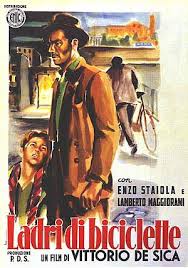
BICYCLE THIEVES (LADRI DI BICICLETTA)
Italy, 1948, 90 minutes, Black and white.
Lamberto Maggioranni, Enzo Staiola, Lianella Carelli.
Directed by Vittorio de Sica.
Bicycle Thieves has been considered for some years one of the greatest films ever made. Vittorio de Sica and his constant writer, Cesare Zavattini, have given us a moving and human document of ordinary people and their plight after the second World War. The film is always associated with the Italian neo-realistic era of film-making, after the war and, indeed, it is a fine example, like de Sica's Shoeshine and Umberto D. Professional actors were not used and de Sica and his crews filmed in the streets and piazzas of Rome, capturing the atmosphere and quality of a life-style that does not exist any more, but which is shown as convincingly real in its day.
The film centres on a family, their poverty, the husband's need for a job, the wife's pawning her sheets, working hard and seeking the aid of a fortune-teller to cope with life. When the husband gets a job pasting up posters and his bicycle is stolen, we are grieved. The scenes of his search, his walking the streets with his little son, the indifferent life of the city, the arrogance of the rich, move us. The plaintive musical score can rightly be called haunting. The climax of the film, very simple in description, where the man succumbs to the temptation of stealing a bike and is caught and humiliated before his son, is almost unbearable to watch. Bicycle Thieves is a worthwhile introduction to film discussion for any group.
1. This is considered one of the best films ever made. Style, content, treatment of human issues?
2. The work of Victorio De Sica in postwar Italian Cinema? The move to neo-realism and the treatment of ordinary people, ordinary human themes, filming in the streets with a sense of authenticity and realism? The implications of this kind of cinema in Italy after the war? As a legacy and record of this period? What it looked like, what it felt like?
3. The use of Roman locations, the streets, the use of amateur players of the central roles? Atmosphere of ordinary people and their problems, relationships, needs, desperation?
4. Rome in the mid-40s? Repercussions of war, poverty, people pawning their goods, employment and the race for jobs? Beggars, thieves, the rich? The unions? The police?
5. The streets and all the detail, cars and trams, posters, Rita Hayworth and the American films, the workers and the early going to work, returning, meetings, the markets, the children begging, the tenements, the lady with the power of sight, people consulting – both rich and poor, football teams and football matches, meals and outings, immersing the audience in this world?
6. The director’s attention to detail communicating feeling, the wife gathering the sheets and washing, bargaining money for them when she pawned them? Joy in getting the money? Getting up in the morning, the first day’s work – the uniform, Bruno’s pride, affectionate farewell? The restaurant meal, comparison with the rich group, the Church sequence of the soup kitchen and the religious ceremony, detailed searching, market-place, long confrontation with the thief in his environment, home, his fix?
7. Sentiment? How well could audiences identify with the protagonists? Antonio, ordinary everyman figure? Hopes for his job, supporting his family, personal pride, as a model for his son? Need for self-respect, earning? The hope of the job, anxiety and getting the bike, satisfaction in having it? Pride in his livelihood? The stealing of the bike, repercussions, his remark to the police that there was such a story behind the theft which people seem to consider so ordinary? People passing him in the street, not knowing or realising how desperate his plight? Desperation building up, the search, intensity of confrontation with the old man? Hopes continually being dashed, the build-up to temptation and desperation, his succumbing to it, immediate humiliation, especially in front of his son? the step-by-step picture of humiliation of an ordinary citizen?
8. Antonio, qualities as a man, strengths and weaknesses? Love for his wife and children, pride in Bruno, trying to do his work well? A man of anger, even to striking his son, desperate, wanting to forget things in the joy of a meal, of the music, worries prevailing, intensity and the confrontations, anxiety about Bruno and the story of the drowned boy, the build-up to his temptation and his succumbing to it and his final tears, Bruno holding his hand?
9. The father and son relationship, walking together, going to work, uniforms, Bruno’s knowledge of the bike? Separating after Antonio hit Bruno? Gradual coming together again of the joy of the meal? Bruno’s admiring his father, shock at the end as he watched his father, wept? Their final hand-in-and as they merged with the crowd and the music came up?
10. Bruno, credible, expressive face, expressions of liveliness, anger and irritation? Pride in the bike, his father, shutting the window when the baby sister was asleep? Going to work, waiting for his father at 7.30? Help in search of other parts of the bike, his reliance on Antonio for direction? Going to the other market, running in the rain and hurting himself, falling? Being hit and his reaction, waiting for his father at the bridge? Hunger and enjoying the meal? The repercussions of his father’s strange behaviour, giving him the money for the tram, seeing his father humiliated and abused, his holding his father’s hand? Coping with this experience?
11. Maria, the attractive young wife in Rome, worry about her husband, the pride in him, the children, washing the sheets, selling them, extra money, joy, the visit to the holy woman,? Affectionate at the beginning of the day, going to see her husband in the Workers’ Union? Ordinary wife and mother?
12. Antonio’s friend, the rehearsal scene with humour, club, the social meeting? Helpers, their great efforts to find the bike? The market, the rackets with the bikes being resold – the policeman and wanting to see the serial number?
13. The stealing of the bike, the plan of the men involved, repercussions on Antonio, his chasing, false lead with the taxi? Confrontation with the boy at the market, chasing him, the interrogation of the old man, finding him immediately after the visit to the holy woman? Arrogance of the thief, his fear, the pressures of the mother and the crowd? Search of the house? Verdict of the policeman that nothing could be done because of the lack of witnesses?
14. Picture of the police, the busy man in the department with so many calls, his treatment of Antonio? The individual police who helped?
15. The visits to La Santora – set up, the people going, Maria’s attitude, her advice to the ugly young man, the ambiguous advice to Antonio, yet the immediate confrontation with the thief?
16. The long sequence with the old man, his character, shuffling away to the church, wanting the soup, his gruff refusal to tell Antonio anything, intensity of Antonio’s pursuing him through the church? The picture of charity in the background, the well-dressed women and the younger amendment? Their trying to quieten him in the church? The oblique comments on religion and charity?
17. The interlude of the rescue of the drowning boy in the river and its effect on Antonio?
18. The happiness of the meal, joy in spending the money, the good food, Bruno’s comparison with the rich boy? The reason?
19. The happiness of the meal, the build-up to Antonio seeing the bikes at the football match, his decision to steal, his letting go and giving in? Audience emotion as he stole the bike?
20. What did Antonio feel as he was caught, as the crowds abused him? The compassion of the owner and his seeing Bruno cry? The final merging in the crowds? What was the audience left with after this experience of basic human needs, desires and sorrows?
___
1. Were you moved by the film? Was it too sad?
2. What understanding of human beings did it give you?
3. How did the realistic filming of the Roman streets give the film a greater authenticity and make it more moving?
4. What kind of man was the father? Did you like him? Feel sorry for him? Were you glad when he got the job?
5. How did you feel when the bike was stolen?
6. What kind of woman was the mother? - her pawning of the sheets, love for the family, going to the fortune-teller?
7. What was so likeable and attractive about the little boy?
8. Why was it so desperate, the search for the bicycle?
9. What was the point of the sequence in the Church and the feeding of the poor by the charitable ladies of Rome? Was the scene critical of religion and such charity? What point was being made?
10. How did the sequence of the meat highlight the social differences of Rome and the problems the film was treating? (The two boys eating their dinner),
11. How strong were the bonds between father and son? How was this shown in the film?
12. How does the film show men as a victim of circumstances - especially where the police, the Church and the union are unable to help the victim?
13. Why did the father steal the bicycle? Why is this act so desperate and so hurting?
14. How was the father humiliated in the eyes of his son? Was this the saddest sequence in the film?
15. Comment on the use of the musical theme, especially as father and son walk the streets of Rome,
16. The film has been considered a masterpiece. Do you agree? Why?
Published in Movie Reviews
Published in
Movie Reviews
Tagged under
Saturday, 18 September 2021 19:27
Beneath the Planet of the Apes

BENEATH THE PLANET OF THE APES
US, 1969, 92 minutes, Colour.
James Franciscus, Linda Harrison, Maurice Evans, Kim Hunter, Charlton Heston.
Directed by Ted Post.
Beneath the Planet of the Apes was basically a commercial venture to make ready money with a sequel to a popular film. The sequel, naturally less surprising, though more spectacular than the original, succeeded at the box-office. Most of the original stars were lured back to act in the film, although it was directed by veteran western and Gunsmoke director, Ted Post.
The film begins with a new astronaut searching for Taylor (Charlton Heston) and the film resumes where the original left off. Thus we know that the planet of the Apes is Earth in 2,000 years time and that the nuclear holocaust occurred. The film can go on from there. It takes up again the story of the apes and provides new but similar episodes to the first film.
The novelty here is the remnant discovered living underground in the previous film's 'Forbidden Zone'; this remnant consists of deformed, but masked, radio-active human survivors who communicate by thought only and who worship the last cobalt bomb in the ruins of New York's St. Patrick's Cathedral. The heroes are caught between the apes and the radio-active people and, after a bloody fight, Charlton Heston, who has done almost everything on the screen, blows up the whole world. As popular science-fiction, the film is entertaining. The sequel is Escape from the Planet of the Apes.
1. This film, unlike its predecessor, starts with the truth about mankind, and implies that it will say more about human nature. Considering the Apes, the animal humans, the two normal astronauts and the underground survivors, what does the film say about being human?
2. Questions 1 - 10 on the discussion sheet for Planet of the Apes can be profitably used.
3. This film stresses the military side of the apes' culture (including an anti-war demonstration). What did the film imply about U.S. militarism in the 60's? - the sequence of the meetings, the jingoistic appeals for war and the popular acclaim, the police and the prisons, the not making martyrs of demonstrators. Do you think the filmmakers were sincere or 'playing to the gallery'?
4. How did Nova show that she was more developed in mind than the other humans? (Her imagination is visualised in the story on Taylor and his disappearance.)
5. What impression did bombed New York and the old posters of New York for a simmer holiday make on you?
6. The life of the people beneath the planet of the Apes, their assertion that words are base and that communication is by brainpower, their torture of making people suffer their illusions, their forcing the men to kill each other?
7. Why did the survivors in the ruins have so much terror of the apes?
8. What was the significance of the apes' vision, their fear and Dr Zeus' going through the fire? Was it because they were "not strong enough to trust their illusions"? What does this mean?
9. The Bomb Liturgy offensive or an effective comment on the survivors? What did you think of their revealing themselves to their God by unmasking and showing their real selves? Why was the bomb their god?
10. The torture scenes, cruel? Why?
11. The impact of the end of the film? What was the purpose of the fighting and the killing? If the world is to be like this, is it better that it be destroyed by nuclear bombs?
Published in Movie Reviews
Published in
Movie Reviews
Tagged under
Saturday, 18 September 2021 19:27
Bedazzled/ 1967
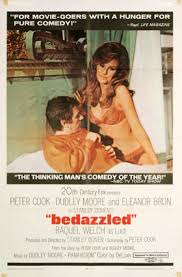
BEDAZZLED
UK, 1967, 103 minutes, Colour.
Peter Cook, Dudley Moore, Eleanor Bron, Raquel Welch, Michael Bates, Barry Humphries.
Directed by Stanley Donen.
Bedazzled was a very popular film when released though some audiences wondered whether they should be laughing at such irreverent jokes. Comedians and writers Peter Cook and Dudley Moore have taken the old legend of Faust and the Devil and treated it in a modern revue style and used the fluidity of the cinema medium to full advantage.
Faust becomes little Stanley Moon in a Wimpy Bar and the Devil is tall, thin George Piggott who runs a London night club in which are housed the Seven Deadly Sins (more revue morality play - including Raquel Welch as Lust and Barry Humphries as Envy). Stanley gets seven wishes in exchange for his soul and the object of his desires is Margaret, who also works for the Wimpy Bar.
The variety of stories in the seven wishes, as well as the main plot, provide wonderful opportunities for Cook, Moore and Eleanor Bron to play a number of roles. Situations are funny and the dialogue witty with the result that Bedazzled comes off as a successful revue morality play.
1. How literally should this film be taken? Would it make much difference to its enjoyment and interpretation if it were taken literally?
2. In the Faust stories, the hero is supposed to represent mankind and sells his soul for power and his skills. How did this film use the traditional stories of Faust and the Devil? How did it change the stories?
3. How typical was Stanley Moon? What value for the film was there in his being the "little man"? Did this make the audience identify with him and feel sorry for him? He couldn't even suicide successfully).
4. What was the effect on the audience of Peter Cook, tall, thin, witty and always in control, as the Devil? What did his being George Spiggott and living in the London underworld add?
5. Why was the film so funny - the situations, the dialogue, the variety of the acting of the three principals, the satire? How did each contribute to the humour?
6. Did the humour lessen the impact of the "morality play" aspects of the film or did the film get a message across through the genial and engaging humour?
7. Why are people prepared to risk selling their souls to the Devil? Did Stanley Moon have good reasons (Margaret Spencer)? Did the Devil make a good proposition? Did he guarantee his promises, e.g. Stanley's wish for an ice-cream?
8. How malicious was the Devil - his story about the Moon family, his entering into all Stanley's wishes and winning, his practical jokes e.g. the telephone lines, the lady and the mouth-wash, his treatment of the seven deadly sins'?
9. George's explanation of why the Devil left Heaven - "this is boring; let's change places"?
10. What aspects of our sophistication were being satirised in: Stanley and Margaret's intellectual conversation about monkeys, Brahms? - their talk about Anglo-Saxon? fear of feeling and Margaret's cries of 'Rape', - the rich (inarticulate) life of Sir Stanley Moon and the discussion of Margaret's being physical (and Stanley's trying to win her by gifts) - the police inspector - the pop scene (and the girls rushing to Peter Cook who sang how he hated and loathed them) - in the domestic scene where the couple feel so guilty because of the goodness of the husband?
11. What was the point of introducing the seven Deadly Sins? Were they effective in the film?
12. Was the leaping order of St. Beryl just farce, or was there some satire on religion? If so, was it effective?
13. Was the Heaven scene humorous? Why? What was the point of George's return to Heaven? Had he repented of was his motivation self-love? Could he ever change?
14. What lesson had Stanley learnt after all his wishes? Do people who sell their souls to the Devil always want them back? Is the moral of the story, that it is better to be and stay oneself, a valid lesson?
15. Was the treatment of religion, God, heaven and hell too flippant? Was the film blasphemous? Some people thought it was.
16. Could this film be called a 'religious' film at all? Why?
Published in Movie Reviews
Published in
Movie Reviews
Tagged under
Saturday, 18 September 2021 19:27
Becket
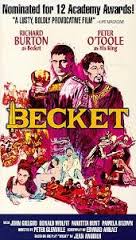
BECKET
UK, 1964, 148 minutes, Colour.
Richard Burton, Peter O'Toole, John Gielgud, Donald Wolfit, Martita Hunt, Pamela Brown, Sian Phillips, Paolo Stoppa, Gino Cervi.
Directed by Peter Glenville.
Becket has become something of a classic. It is a pageant, but it is also a thoughtful study of man and the Church. Thomas a’ Becket has been the subject of a number of plays, the most famous of which is T.S. Eliot's Murder in the Cathedral. Henry II is the subject of Christopher Fry's Curtmantle and James Goldman's The Lion in Winter. Here the account is partly fictionalised (and some people have taken offence at this liberty with a canonised saint's life) but the balance is given between Becket, the worldly chancellor, and Becket, the saintly archbishop of Canterbury, and his relationship with Henry at both stages of his life.
This is the talent of popular French playwright, Jean Anouilh, who also wrote an interesting fictionalised play about Joan of Arc, The Lark. Sets, costumes, acting were all nominated for various awards, Peter O'Toole took up the role of Henry II later in The Lion in Winter. But the film is Richard Burton's. He is completely convincing at each stage of the film.
1. Was this merely a lavish spectacle or does it have strong themes?
2. Did Richard Burton's acting convince you, firstly, that Becket was a fit companion for the king in his politics and his pleasures; and, secondly, that he had undergone a genuine conversion and change of heart, so that his martyrdom was a fitting climax for the film?
3. What were Becket's motives in each part of the film?
4. The film's themes?
5. Discuss Becket as an authority figure in the film. A suitable model for to-day?
6. Why did Becket excommunicate Henry? The pros and cons of the decision?
7. What role did the French king play in the story? and in the film?
8. Were the scenes with the Pope and the Cardinals at Rome realistic or caricatures?
9. Christ's ideals of authority included service and laying down one's life. Was Becket an authentic Christian?
10. Why did Henry want Becket made a saint?
11. What interested audiences most in the film: Henry and Becket, Church- state conflict, Norman- Saxon antagonism, twelfth century life and history?
12. The film was based on a stage play. Was the film confined or had the screenplay successfully translated theatre into cinema? How?
Published in Movie Reviews
Published in
Movie Reviews
Tagged under
Saturday, 18 September 2021 19:27
Babymaker, The
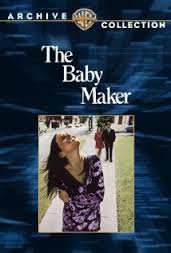
THE BABYMAKER
US, 1970, 109 minutes, Colour.
Barbara Hershey, Collin- Wilcox Horn, Sam Groom, Scott Glenn.
Directed by James Bridges.
The Babymaker is a most unusual film. It takes an unlikely and potentially repugnant theme and makes a sympathetic movie of it which 1s quite successful. A young 'with-it' girl agrees to bear a baby for a childless couple, unable to have a child of their own. It 1s to be fathered by the husband. Conditions are agreed on and all three take an intense interest in the pregnancy. The audience also lives through the pregnancy month by month and the birth scene 1s presented vividly.
What began as a rather clinical, impersonal contract - the couple longing for a child for themselves, the girl getting her kicks and her meaning in life by bearing the baby - affects the lives of all of them in ways they did not anticipate. When the plan is fully accomplished, we are forced to ask ourselves whether it was worthwhile and what they (and ourselves) have learnt from the experience. The film avoids sentimentality and sensationalism and avoids most of the pitfalls possible for this kind of film. There is a great deal of humour (especially a staged demonstration outside a toy shop selling guns) and some warm performances by the three principals.
Barbara Hershey is vivacious and shows a wilful, seemingly irresponsible girl growing wiser. She is a good actress (Last Summer, The Pursuit of Happiness and a small part in The Liberation of L.B. Jones.)
The Babymaker asks for adult appreciation about the realities of producing a human being.
1. Reaction to the basic idea behind the film - the conception of a baby for a childless couple? The issue of surrogacy?
2. What kind of girl was Trish - how 'with-it', how responsible, how moral?
3. Why did she agree to take on the pregnancy? Her getting her kicks out of producing life? What had been her reaction to her previous pregnancy?
4. Why did the Wilcoxs go into this arrangement? What were Jay's motives? What were Suzanne's? Were they being selfish?
5. How calculated was the whole deal? Was the fact that it was so planned in 'cold blood' an inevitable factor in the plane not working out as expected?
6. What Was Trish's boyfriend's reaction to the arrangement? Was his the normal person's reaction? Did Trish explain things satisfactorily to him?
7. What impression did the film give of pregnancy? Did it help the audience share the 9 months' duration, the pain, the happiness, the expectation of new life?
8. Did Trish take her pregnancy seriously - what about her exercise, her belly-dancing?
9. Did Suzanne interfere too much? Did she have a right to live the pregnancy with Trish? (What about her cleaning up the shop for Trish and the boyfriend?)
10. What effect did the scenes of the childbirth itself have on you coming as they did after the lengthy and vivid experience of the pregnancy?
11. How did Trish change and grow up during the twelve months of the film? (The relevance here of the friend who was critical of the establishment and people like the Wilcoxs? the fake demonstration?)
12. What attitude to the baby did Trish have at the end of the film as she watched the couple go? What had she learnt about marriage, children, life?
13. What would became of her after the film ends?
14. Did the film have a moral point of view? What judgment did the film make on the whole plan - what did it show in its favour? What did it show against it?
15. What did the film have to say about the attitudes and morals of to-day's generation,, of marriage and about the sacredness of life?
16. What was the effect of the song 'People come, people go' during the film - its mood, its lyrics?
Published in Movie Reviews
Published in
Movie Reviews
Tagged under
Saturday, 18 September 2021 19:27
Bad Day at Black Rock
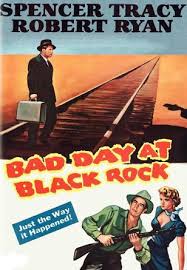
BAD DAY AT BLACK ROCK
US, 1954, 84 minutes, Colour.
Spencer Tracy, Robert Ryan, John Ericson, Dean Jogger, Walter Brennan, Anne Francis, Ernest Borgnine, Lee Marvin.
Directed by John Sturges.
Bad Day At Black Rock, marked the emergence of John Sturges as a major director and the film 1s considered 6y most critics as something of a classic Western - contemporary yet exploring the effects of some of the Western myths of the past.
The film is concise, set in Black Rock, with action covering only twenty-four hours. It has an element of mystery as a stranger steps off a train which has not stopped at Black Rock 1n four years. Gradually he uncovers secrecy, bullying, guilt and shame, and opens up a racist theme - U.S. attitudes towards American Japanese during the war. The film is melodramatic, but tightly tense, unified by the commanding performance of Spencer Tracy as the one-armed stranger who is forced to fight for survival with his wits and physically while he exposes guilt. The supporting cast is excellent, performing in roles we are accustomed to see them in, but effective nonetheless.
A serious film which holds the interest.
1. Was this a Western? - note the ingredients of Westerns - the geographical setting, its harsh and frontier isolation, its vehicles, weapons, legends, victim, heroes and heroics, its melodramatics.
2. Discuss the theme of guilt in the film - the secrecy of the town, the social guilt and its demoralising effect, drunkenness, prejudice, fear of a boss, and greed.
3. What comment on American racism is made in the film - the role of the Japanese American, Pearl Harbour and the shooting, the son saving a life in war?
4. The nature of toughness - tough poses and attitudes, bullying versus truth and efficient training (the one-armed man felling a bully with karate chops)?
5. Discuss the goodness and badness in each of the principal
6. characters, especially their selfishness and the way they used each other.
7. This film is considered a classic Western melodrama (despite Andre Previn's exaggerated score). Do you agree?
Published in Movie Reviews
Published in
Movie Reviews
Tagged under
Saturday, 18 September 2021 19:27
Beneath Clouds
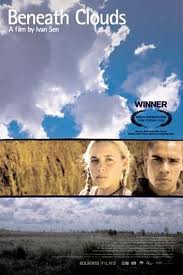
BENEATH CLOUDS
Australia, 2001, 90 minutes, Colour.
Damian Pitt, Danielle Hall.
Directed by Ivan Sen.
Beneath Clouds won an award at the Berlin Film Festival in 2002 for its themes and for its director's first feature. It also formed part of the group of Aboriginal films released in 2002 in Australia - Australian Rules, Rabbit- Proof Fence, Black and White, The Tracker.
This is a brief film about two teenagers living in a town in north-western New South Wales. Lena has a dark-skinned mother and rejects the Aboriginal family around her. She is looking for her Irish father. Vaughn is a teenager living in a prison camp. When he gets out of the prison, he decides to go to Sydney. The two young people meet together and go on a road trip to Sydney, understanding themselves, understanding one another.
The film reflects life in country towns in Australia, the white families, the Aboriginal settlement. It also reflects the anger in young Aboriginal teenagers trying to find their identity and trying to hope for a future.
1. The history of Aboriginal themes in Australian cinema? Tribal Aborigines? Urban Aborigines? The remote towns of the Australian countryside?
2. The title, the credits and the atmosphere, the film's impact for Aboriginal audiences? The evoking of 19th century history, 20th century history at the beginning of the 21st?
3. North-western New South Wales, the flat countryside, the silos and the town, the cotton, the corn? The distant mountains, the bush? The film and its range of country landscapes? Special sites? The industrial aspects of Australia, the city of Sydney?
4. The Australian road, the road trains, the cars, walking along the roads? The towns, the hotels? The train?
5. Vaughn's story, the tree, the guard, the clashes, his sister, talking with the boy, the escape?
6. Lena's story, at home, her mother, her relationship with her mother, her age, her angers? The boys, eating, pregnancy? The seeming hopelessness? Home, going to the station, cigarettes, her mother drunk, the stepfather and the beating? Her room, the crucifix, the album? The postcard and her desire to find her Irish father? Leaving, the bus, eating, being sick, missing the bus, walking, encountering Vaughn?
7. Vaughn in himself, talking to Lena, his parents, his father, criminal? The cars, two years? His anger and surliness? Attitude towards the white people? The lifts, his hitting the woman? Friends?
8. The two young people, in themselves, the encounter, discussions? Walking, the cornfields, the pub, the police? Not telling them what was going on?
9. The police, the stereotypes of the police, their attitudes towards Aborigines, towards teenagers? The bashings? Licences?
10. Lena, her dreams, Ireland? The album? The old woman and the people? Her facing the truth?
11. The religious background of the film, the scene in the church, talking to God? The place of crosses?
12. Mother, death, the station? Running away?
13. Getting nearer to Sydney, the possibilities of a new life, escaping the drudgery of their lives, people's attitudes towards them? Sydney as a sign of hope for the future?
Published in Movie Reviews
Published in
Movie Reviews
Tagged under
Saturday, 18 September 2021 19:27
Brokedown Palace
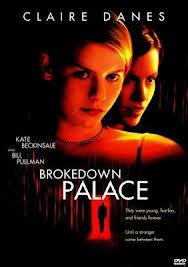
BROKEDOWN PALACE
US, 1999, 97 minutes, Colour.
Claire Danes, Bill Pullman, Kate Beckinsale, Lou Diamond Phillips, Jacqueline Kim, Daniel la Paine, Paul Walker.
Directed by Jonathan Kaplan.
Broke Down Palace is yet another film about naïve Americans abroad, caught up in drug dealing in South - East Asia. Other films of this time include The Beach and Return to Paradise. Broke Down Palace focuses on two young women, having a holiday after completing college. They are enjoying their time in Thailand, go into a swanky hotel and pretend to be residents there, attract the attention of an agreeable young Australian who romances them. He also recruits them, unknowingly, to be smugglers of drugs to Hong Kong. In fact, there are a number of women carrying drugs on the same flight but he has tipped off a corrupt policeman who arrests the two girls and imprisons them.
The film highlights the helplessness of the girls in the face of this kind of arrest, prison treatment, treatment by the strict Thai courts. They enlist the help of Bill Pullman as a lawyer married to a Thai woman. He seems to be in it for the money, but finally helps them. Lou Diamond Phillips is an American embassy official, who knows the truth about the Australian (who is played by Daniel la Paine of Muriel's Wedding).
Claire Danes and Kate Beckinsale are convincing as the two young women. There are complexities of the plot, they are persuaded to make a confession for the judge as an act of humility. The Claire Danes character, who blames herself for what has happened, confesses to the full crime so that her friend can be freed. Direction is by Jonathan Kaplan who directed quite a number of brisk and brief action films in the 70s like White Line Fever and also directed such films as Jodie Foster's award-winning performance in The Accused.
1. A film for American audiences, younger audiences? A salutary warning about South - East Asia, drugs and justice?
2. The American settings, placing the girls in their context? Family, college? The transition to Thailand, Bangkok, seemingly exotic, the cheap hotels, the five-star hotels? The courts of justice? The contrast with the prisons, and the treatment of women prisoners in the prisons? The musical score?
3. The title, the Thai prisons and the effect on the young women?
4. The film as a warning, drug dealing, drug smuggling? Naïve Americans being picked on by groups to be the fall-guys for the law? Corrupt Thai officials? The nature of Thai justice, saving face, the contrast between Asian methods of justice and those of the United States?
5. The quick portrait of the two young women, Alice, her clashes with her parents? Darlene and the loving family? Their being best friends? The decision to go to Thailand? Arrival, finding accommodation, looking at the sights, the markets? Naivety and enjoyment? In the hotel, putting the drinks on the false bill, Nick Parks and his meeting them, his charm? Darlene and the infatuation, going with him? His discussions with Alice - and the relationship not being seen? The tickets for Hong Kong, the enthusiasm, the arrival at the airport, the suddenness of the drama of their arrest?
6. The arrest, justice, the police, the drugs in their knapsacks? The sentence? In prison, the style of life in prison, the loss of freedom, the crowding, treatment by the other women, the guards? Their attempt to escape, their being caught, extra time for their sentence? The contact with their parents, Alice's father and his initial disbelief? Darlene's family and their support? Finding the money?
7. Hank, his practice in Thailand, his wife? The touch of cynicism? His going to the prison, disbelief at first? Support, his wife doing the research? The inability to find Nick Parks? The contact with the police? The tactics, the strategy in the court, the visit to the policeman and the confrontation? Alice's outbursts? The decisions by the judge, the family's running out of money? Hank and his continued interest, his following through, the investigations? The truth about Parks and the police, the women on the plane all smuggling drugs, the girls being arrested? His plan for the confession, for the respect to the court? His presentation, the police chief and his manipulation, turning the verdict around?
8. The effect of prison on the two girls, the truth about their relationship with Nick, the clashes? Darlene and her illness? Hospitalisation? The reconciliation? The attempt to escape? Hank and his help, their fears, going to the court? The reversal of the planned decision, their not being freed? Alice and her confession, taking the blame, the judge respecting her confession, allowing Darlene to go free?
9. The friends coming from the United States, visiting the girls in prison? The reality of the different ways of life in South-East? Asia and in America?
10. The finale, Darlene and her leaving, Alice and her decision to remain for the rest of her sentence? The self-sacrifice?
11. An interesting glimpse of American tourists in Asia, the hazards, the naivety, the assumptions about American way of life and its superiority, the impact of prison? A story of self-sacrifice on the part of Alice?
Published in Movie Reviews
Published in
Movie Reviews
Tagged under
Saturday, 18 September 2021 19:27
Batman and Robin
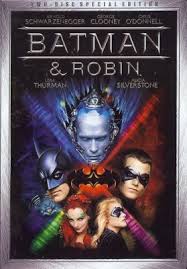
BATMAN AND ROBIN
US, 1997, 125 minutes, Colour.
Arnold Schwarzenegger, George Clooney, Chris O'Donnell, Uma Thurman, Alicia Silverstone, Michael Goff, Pat Hingle, Elle McPherson?, John Glover, Vivica A. Fox.
Directed by Joel Schumacher.
With the fourth in the Batman series, we have moved from a grim and gloomy Gotham city and a grim and gloomy Michael Keaton to a theme park comic sinister world and a more solid Bruce Wayne (after Val Kilmer) in the form of ER's George Clooney. Not only is Chris O'Donnell Robin, but Alicia Silverstone has turned up as Batgirl. However, it is always the villains who are larger than life (although Arnie is large in life as well). Mr Freeze cracks deadpan puns in the heavy Schwarzenegger manner, but Uma Thurman enjoys the chance to be alluringly complex. And, of course, the special effects are designed to make the audience gasp. The Batman films have become entertainment concoctions.
This was said to have killed off the Batman franchise, but it came to new life in Christopher Nolan’s 2005 Batman Begins.
1. The fourth film in the Batman series? The second by Joel Schumacher? The parallels with the 1960s series? The contrasts with Tim Burton's darker vision? Schumacher's flair, colour, design, characters and caricature?
2. The change of Batman to George Clooney? What Clooney brought to the role? Chris O'Donnell again as Robin? Alicia Silverstone as Batgirl?
3. The focus on Batman and Robin, their relationship, mentor and apprentice, their working together, Robin and his growing resentment of Batman telling him what to do, the double infatuation with Poison Ivy? The rivalry, the bickering? Robin finally having to learn how to collaborate with Batman and with the family? Batman and Robin and their ordinary personalities as Bruce Wayne and Dick Grayson, friendship, in the house, the collaboration against crime, with Barbara, with Alfred? The relationship between the two, emotional, dependence?
4. The villains, Arnold Schwarzenegger as Mr Freeze, his makeup, manner of speaking, ice and cold wisecracks? His motivation, his ill wife, his investigations, his resentment against society? His wanting to destroy the world? The contrast with Dr Pamela Isley, her work, Dr Woodrue and his double-dealings, her resentment? The experiment, her being transformed into Poison Ivy, the glamour, the costumes, the growths, the femme fatale style in contrast with her original persona, bespectacled and timid? Her motivation? Her intrigues against Batman and Robin? In collusion with Mr Freeze, killing his wife (and this filmed and being replayed to Mr Freeze)? Her wiles, her conflict with Batgirl? Her defeat? Mr Freeze, his attacks, his needs for jewels and diamonds to keep cold, his being taken, finding it too difficult to go beyond the freeze barrier? Poison Ivy and her lies? freeing him? The final confrontation, his being taken, Batman promising him a new life and restoring his wife to him? The popularity of this kind of villain?
5. Alfred, the servant, the butler, the confidant? His service in the household, his illness, his dying? Sending for Barbara, her arrival, care for her uncle? Her penetrating the codes, his speaking to her from the screen monitor, the mission for her uncle? The recovery and the curing of the disease?
6. Bruce Wayne, his place in society, at social functions? His relationship with Julie, her wanting to marry him? His refusal?
7. Barbara, her arrival, intelligent, friendly, penetrating the secrets of the Bat Cave, becoming Batgirl, her fight with Poison Ivy, joining the family?
8. The city, the police commissioner and his trying to cope, the Bat Signal at the top of the building, his using it?
9. The set pieces: the initial attack by Mr Freeze, the spectacle, the explosions? The need to out-top the opening? The auction, Batman and Robin bidding, Poison Ivy manipulating them, the attack by Mr Freeze? The final confrontations between heroes and villains?
10. The flashbacks and the explanation of Bruce Wayne's life, Alfred and his friendship and devotion?
11. The supporting characters, society people, eccentric characters, especially Dr Woodrue and his associates?
12. Bane, Poison Ivy and her creating the monster, taunting him, letting him loose, his destruction?
13. The popularity of the series, the two Tim Burton films, the two Joel Schumacher films - and the camp flair and spectacle of the Schumacher versions, the less dark Gotham City, the spectacle, song and dance routines? The end of the series?
Published in Movie Reviews
Published in
Movie Reviews
Tagged under
Saturday, 18 September 2021 19:27
Black Point
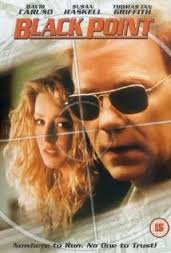
BLACK POINT
US, 110 minutes, Colour.
David Caruso, Susan Haskell, Thomas Ian Griffiths, Miguel Sandoval, Gordon Tootootsis.
Directed by David Mackay
Point Black is a police thriller. It is an average entertainment, rather slow in building up to the action - although it can be misleading, audiences thinking that leading lady, Susan Haskell, is as innocent as she looks and sounds. However, it is soon clear that she is in the film noir tradition, the femme fatale who is eager for the money and will let no-one stand in her way.
David Caruso is the ex-navy veteran, an alcoholic after the abduction of his daughter. He works at a local café, a fishing village, friendly with a native American (Gordon Tootootsis). Thomas Ian Griffiths is a drug runner and money launderer for big power, Miguel Sandoval.
David Caruso appeared in a number of films like this after his leaving NYPD Blue and his comeback in CSI Miami.
1. Entertaining thriller? Familiar material? Run-of-the-mill kind of story? Yet, keeping audience interest?
2. The town of Point Black, the sea, the coast and the woods? The musical score? The significance of the title and its tone?
3. The introduction to Jack, the abduction of his daughter, the reaction of his wife, his past expertise in the navy, well trained, his becoming an alcoholic? His working at the diner, his being friends with The Bear? The delivery to Natalie, her asking him to fix the sink, the friendship, his return? His infatuation with Natalie? His surprise at her turning against him? Her framing him? The pursuit, his hiding and her thinking he was dead? His pursuit of Gus, of the criminals? Bear and his being tortured? The sheriff, discussions with her? His being taken, getting away, the pursuit of Gus, the money, the shooting? Natalie and her continued plot twists? The ultimate confrontation, Gus's death? His visiting Natalie in prison?
4. Natalie, the seemingly abused housewife, her fears of Gus, the bond with Jack, his hiding her, their going out, the sexual relationship? Her brutality towards him? Her not killing him, infatuation with him, the pursuit, her thinking he was dead? Her injuring herself and roughing the house? Her going to hospital, the explanations to Gus, the police? Her intrigues, blaming Malcolm, switching from one stance to another, saying that Jack was not the intruder? Her going for the money, the confrontation with Gus, her shooting him? Her going to prison - and hopes for a relationship with Jack?
5. Malcolm, the drug chief, the method of money laundering, his henchman, the boats? The double-dealings, the shootings, the bashing of The Bear and of Jack? Jack fighting back?
6. Gus, his relationship with Natalie, the money laundering, his brutality, professions of love, the money missing, his brother dead? His anger, the pursuit of Jack? His pursuit of Malcolm, believing Natalie? The final shoot-out?
7. The sheriff, her work in the town, her friendship with Jack, believing him? The pursuit of evidence? Fred as her assistant, the fact that he was being paid off by Gus, his phone call?
8. The familiar story of drug dealing, drug bosses, money laundering, the lone hero with a grudge, the femme fatale and her manipulation of people's emotions, the betrayals, the shoot-outs? Familiar American stories?
Published in Movie Reviews
Published in
Movie Reviews
Tagged under